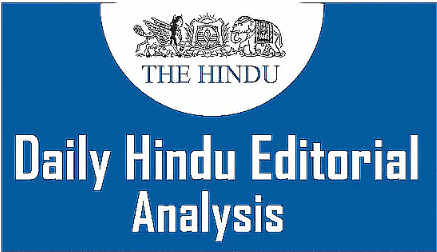The Hindu Editorial Analysis- 14th April 2025 | Current Affairs & Hindu Analysis: Daily, Weekly & Monthly - UPSC PDF Download

A Governor’s conduct and a judgment of significance
Why is it News?
A recent ruling by the Supreme Court has clarified the role of the Governor in India, stating that the Governor is not an independent authority but must adhere to legal rules and democratic principles.
Governor’s Role in Respecting Democracy
- The Supreme Court addressed the issue of the Governor not acting on Bills passed by the State Legislative Assembly. The Court highlighted that delaying or refusing to act on Bills without valid reasons undermines the Constitution and democratic principles.
- The case involved 12 Bills, some dating back to 2020, including laws that aimed to limit the Governor’s authority in appointing Vice-Chancellors.
Delay in Action and Legal Challenge
- The Governor had delayed taking action on these Bills for an extended period.
- When the State government approached the Supreme Court in 2023, the Governor referred two Bills to the President. Subsequently, the Assembly re-passed 10 Bills in a special session, but the Governor again sent all of them to the President.
- Out of these, the President approved one Bill, rejected seven, and left two undecided.
Federal Structure and Division of Powers
- The Constitution of India delineates the division of powers between the Union and State governments.
- States have full authority over subjects listed in List II of the Constitution’s Seventh Schedule. Although the Governor is appointed by the Union government, he is expected to act on the advice of the State’s Council of Ministers, except in specific circumstances.
Understanding Article 200
- Article 200 of the Constitution outlines the Governor’s options when a Bill is passed by the Assembly. The Governor can approve the Bill, return it for reconsideration, or reserve it for the President’s approval.
- The Union government argued that the Governor could withhold assent without explanation, a practice known as pocket veto. However, the Court rejected this notion, emphasizing that the Governor does not possess such independent authority.
Discretionary Powers and Judicial Review
The Court identified three exceptional situations where the Governor can act without the advice of the Council of Ministers:
- When a Bill affects the powers of a High Court.
- When the Constitution requires the President’s approval, such as under Article 31C.
- When a Bill contravenes fundamental constitutional values.
Even in these cases, the Governor’s actions are subject to judicial review, as Article 361 protects the Governor personally but not his decisions.
Court’s Final Decision Using Article 142
The Supreme Court deemed the Governor’s actions unconstitutional. Instead of ordering the Governor to approve the Bills, which would be challenging to enforce, the Court, using its power under Article 142, declared that the 10 Bills were approved from the date they were re-submitted.
Conclusion
This Supreme Court decision not only resolved the specific issue regarding the Bills but also conveyed a broader message about the Governor’s role. It reinforced the idea that the Governor must collaborate with the State government and uphold democratic values. The office of the Governor is intended to safeguard the Constitution, not to create political disputes.
|
38 videos|5293 docs|1118 tests
|
FAQs on The Hindu Editorial Analysis- 14th April 2025 - Current Affairs & Hindu Analysis: Daily, Weekly & Monthly - UPSC
| 1. What are the key responsibilities of a Governor in a state? |  |
| 2. How does the conduct of a Governor impact the functioning of the state government? |  |
| 3. What role does public opinion play in the judgment of a Governor's actions? |  |
| 4. How do judicial judgments affect the authority of a Governor? |  |
| 5. What are the implications of a controversial Governor's conduct on state politics? |  |
















